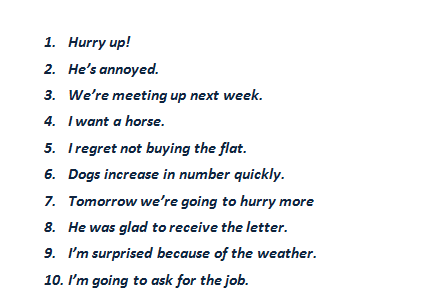Verbs
Reflexive verbs
Some verbs can be reflexive in one language but not in another. Therefore, it is a good idea to learn which verbs are reflexive.
Reflexive verbs can go with the accusative or with the dative. However, the majority go with the accusative.
Er freut sich. / He is glad
But some reflexive verbs go with the dative:
Ich wünsche mir. / I wish
Here are some popular reflexive verbs in German:
sich wünschen / to wish
sich verabreden / to remain
sich vermehren / to increase
sich bewerben / to request
a) Position of reflexive verbs in a sentence
With present and past sentences, the reflexive pronoun goes after the verb.
Present: ich beeile mich / I'm in a hurry.
Past: ich beeilte mich / I was in a hurry.
With present perfect, past perfect and future perfect sentences, the reflexive pronoun goes between the auxiliary verb and the participle.
Present perfect: ich habe mich beeilt
Past perfect: ich hatte mich beeilt
Future perfect (Futur II): ich werde mich beeilt haben
In future sentences, the reflexive verb goes between the auxiliary verb werden and the infinitive:
The Future (Futur I): ich werde mich beeilen
In sentences where the infinitive is used, the pronoun goes in front of the infinitive.
Reflexive verbs can also be separable.
Infinitive: Er muss sich beeilen.
Mein Mitbewohner kennt sich hier noch nicht sehr gut aus
In this case, the sentence can be constructed according to the same model used for reflexive verbsS. The prefix is placed at the end.
---------------- oooo O oooo ----------------
Exercises
Translate the following sentences.
(Click on the box to see the answers; double click to return to the original position)


